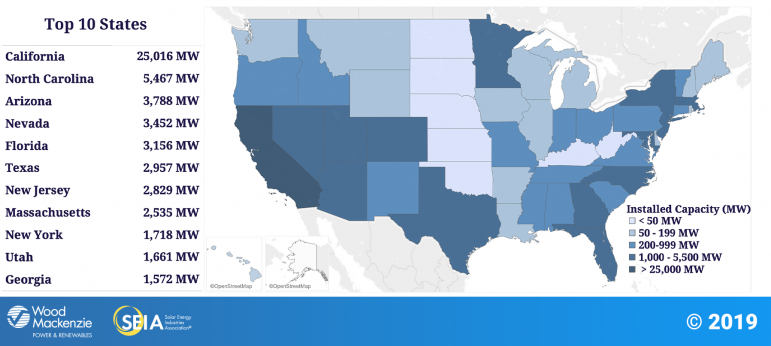Public Hearing to Consider Future of Alabama Power’s ‘Solar Tax’
Birmingham’s Eagle Solar and Light is one of a handful of solar installation companies in Alabama. About 90% of their customers are commercial clients, such as banks or manufacturers. But Paul Freeman, Eagle Solar’s sales director, says they occasionally get calls from residents who are thinking about installing solar panels.
“Most folks that call us are very interested in reducing their power bill,” Freeman says. “Once they find out that the Alabama Power company has this reservation fee that ends up consuming about 40 to 50% of their savings per month, it makes it a difficult choice for them.”
Freeman says homeowners often choose not to go with solar.
This reservation fee, which some refer to as a solar tax, applies to residents who install solar systems and remain connected to Alabama Power’s grid. Alabama Power started charging it a few years ago at $5 a month per kilowatt nameplate capacity. For the average homeowner who might install a 5-kilowatt system, that means a $25 monthly charge on top of the regular fees that all customers pay the utility provider.
Alabama Power officials say the fee covers the cost of maintaining backup electricity that solar users need on a rainy day. But environmental advocates are not buying it.
“We contend that there’s no need for a backup charge, that the charge as it is, is unjust, unreasonable and against the public interest,” says Keith Johnston, attorney with the Southern Environmental Law Center.
Johnston and others want the Alabama Public Service Commission (PSC), the agency that regulates state utilities, to eliminate the fee. Environmental groups filed a complaint with the commission in 2018. But Alabama Power officials say the charge is fair, and they’ve proposed an increase from $5 per kilowatt capacity to $5.42.
Sean Gallagher, vice president of state affairs for SEIA, the national solar trade association, says most states do not impose this kind of fee.
“That’s pretty regressive and it’s in fact not common,” Gallagher says. “Because regulators in almost every state where this kind of proposal has come up has rejected it.”
According to Gallagher, a growing number of states encourage solar investment with tax breaks and other incentives, but not Alabama.
“Alabama stands near the bottom of installations in the US on a state-by-state basis,” he says.

Sam Yates, owner of Eagle Solar and Light, says Alabama is missing out on an opportunity to grow statewide solar investment. In addition to Alabama, his company installs systems in Georgia and North Carolina, states that both rank nationally in the top 10 for solar installations.
“So it’s not a matter of the southeast not getting enough sun,” Yates says. “It’s a matter of the regulatory policy here.”
The PSC will hold a public hearing Thursday to hear testimony from those who both support and oppose Alabama Power’s solar backup fee. Officials say the commission will consider the arguments and issue a decision at a later date.
The public hearing will take place at 9 am at the Carl L. Evans Chief Hearing Complex, RSA Union Building, 100 North Union Street, Room 900, Montgomery, Alabama.
Note: Southern Environmental Law Center is a supporter of WBHM programming. Our news and business departments operate independently.
Bill making the Public Service Commission an appointed board is dead for the session
Usually when discussing legislative action, the focus is on what's moving forward. But plenty of bills in a legislature stall or even die. Leaders in the Alabama legislature say a bill involving the Public Service Commission is dead for the session. We get details on that from Todd Stacy, host of Capitol Journal on Alabama Public Television.
My doctor keeps focusing on my weight. What other health metrics matter more?
Our Real Talk with a Doc columnist explains how to push back if your doctor's obsessed with weight loss. And what other health metrics matter more instead.
Baz Luhrmann will make you fall in love with Elvis Presley
The new movie is made up of footage originally shot in the early 1970s, which Luhrmann found in storage in a Kansas salt mine.
Forget the State of the Union. What’s the state of your quiz score?
What's the state of your union, quiz-wise? Find out!
A team of midlife cheerleaders in Ukraine refuses to let war defeat them
Ukrainian women in their 50s and 60s say they've embraced cheerleading as a way to cope with the extreme stress and anxiety of four years of Russia's full-scale invasion.
As the U.S. celebrates its 250th birthday, many Latinos question whether they belong
Many U.S.-born Latinos feel afraid and anxious amid the political rhetoric. Still, others wouldn't miss celebrating their country







